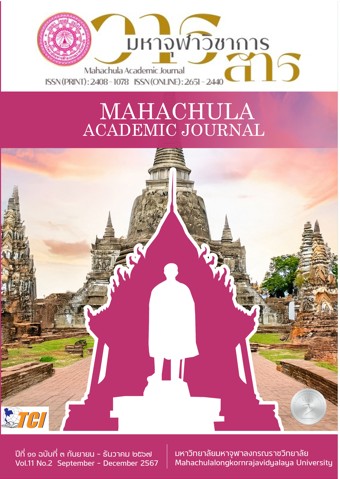The System Leadership Of School AdminIstrators Under The Primary Educational Service Area Office Pathumthani 1
Main Article Content
Abstract
The objectives of this research article are : (1) to study the systematic leadership of educational institution administrators; and compare the systematic leadership of school administrators Under the jurisdiction of the Pathumthani Primary Educational Service Area Office, Area 1 (2) to compare the systematic leadership of school administrators. Under the jurisdiction of the Pathumthani Primary Educational Service Area Office, Area 1, classified by educational level. Work experience and size of educational institution The sample group used in this research included teachers performing teaching duties in educational institutions. Under the jurisdiction of the Pathumthani Primary Educational Service Area Office, Area 1, in the academic year 2023, there were 322 people. The research instrument was a questionnaire regarding the systematic leadership of educational institution administrators. Under the jurisdiction of the Pathumthani Primary Educational Service Area Office, Area 1, statistics used in the research are percentages, averages, and standard deviations. T-test, one-way analysis of variance (One-way ANOVA), and comparison of differences in mean scores by pair using Scheffé's Method.
The results of the research found that (1) teachers' opinions on the systematic leadership of school administrators Under the jurisdiction of the Pathumthani Primary Educational Service Area Office, Area 1, overall and each aspect is at a high level. 2) Comparison of teachers' opinions on the systematic leadership of school administrators. Under the jurisdiction of the Pathum Thani Primary Educational Service Area Office 1, it was found that teachers with an education level Work experience and different sizes of educational institutions Have opinions on the systematic leadership of educational institution administrators Under the jurisdiction of the Pathumthani Primary Educational Service Area Office, Area 1, overall and in each aspect, it was found that they were significantly different at the .05 level.
Article Details

This work is licensed under a Creative Commons Attribution-NonCommercial-NoDerivatives 4.0 International License.
References
กมลวรรณ ชัยวานิชศิร.“ปัจจัยที่เกี่ยวข้องกับผู้บริหารที่สัมพันธ์กับประสิทธิผลของโรงเรียนเอกชน”.วิทยานิพนธ์ศึกษาศาสตรมหาบัณฑิต. สาขาการบริหารการศึกษา มหาวิทยาลัยศรีนครินทรวิโรฒ ประสานมิตร, 2536.
ขวัญทิรา ทิราวงศ์.“ภาวะผู้นำเชิงกลยุทธ์ของผู้บริหารสถานศึกษา สังกัดสำนักงานเขตพื้นที่การศึกษา
มัธยมศึกษาเขต ๓๗”. วิทยานิพนธ์ครุศาสตรมหาบัณฑิต. สาขาวิชาการบริหารการศึกษา มหาวิทยาลัยราชภัฏรำไพพรรณี, ๒๕๖๓.
จุฑาภรณ์ ธนกวีศิล.“แนวทางการบริหารจัดการโรงเรียนแกนนำเรียนร่วม โดยใช้ทฤษฎีเชิงระบบ”.วิทยานิพนธ์ศึกษาศาสตรมหาบัณฑิต. การบริหารการศึกษา มหาวิทยาชัยราชภัฎอุตรดิตถ์, 2561.
เนตรนภิส นพเกตุ.“การพัฒนารูปแบบภาวะผู้นำเชิงระบบของผู้บริหารสถานศึกษาสังกัดสำนักงานเขตพื้นที่การศึกษาประถมศึกษาในจังหวัดฉะเชิงเทรา”. ปริญญานิพนธ์ศึกษาศาสตรดุษฎีบัณฑิต. สาขาการบริหารการศึกษา, มหาวิทยาลัยบูรพา, 2562.
บังอร สาคลาไคล. “พฤติกรรมผู้นำของผู้บริหารที่ส่งผลต่อการบริหารงานวิชาการในสถานศึกษาขั้นพื้นฐาน สังกัดสำนักงานเขตพื้นที่การศึกษาสมุทรสาคร”.ปริญญานิพนธ์ศึกษาศาสตรมหาบัณฑิต. สาขาการบริหารการศึกษา มหาวิทยาลัยศิลปากร, 2550.
ปัณณวิชญ์ ใบกุลาบ. “การพัฒนารูปแบบการเรียนการสอนประวัติศาสตร์ เพื่อส่งเสริมการคิดเชิงระบบ
สำหรับนักเรียนชั้นมัธยมศึกษาปีที่ ๓”.วิทยานิพนธ์การศึกษาดุษฎีบัณฑิต. สาขาการวิจัยและพัฒนา
หลักสูตร มหาวิทยาลัยราชภัฏพิบูลสงคราม, 2561.
มกราพันธุ์ จูฑะรสก. การคิดอย่างเป็นระบบ : การประยุกต์ใช้ในการเรียนการสอน. พิมพ์ครั้งที่ ๒.
กรุงเทพมหานคร: โครงการสวัสดิการวิชาการ สถาบันพรบรมราชนก, 2551.
สมชาย เทพแสง. “ภาวะผู้นำเชิงระบบ (System Leadership) : รูปแบบที่มุ่งคุณธรรมสู่ความเป็นมืออาชีพ”.
วิทยานิพนธ์การศึกษาดุษฎีบัณฑิต. ภาควิชาการบริหารการศึกษา, คณะศึกษาศาสตร์ :
มหาวิทยาลัยศรีนครินทรวิโรฒ, 2560.
สำนักงานเขตพื้นที่การศึกษาประถมศึกษาปทุมธานี เขต ๑.“รายงานการพัฒนาคุณภาพการศึกษา ปีงบประมาณ
”. รายงานการวิจัย. ปทุมธานี : สำนักงานเขตพื้นที่การศึกษาประถมศึกษาปทุมธานี เขต 1,
๒.
อารีย์ เรืองภัทรนนต์. “การพัฒนารูปแบบการคิดเชิงระบบเพื่อส่งเสริมทักษะการแก้ปัญหาเชิงสร้างสรรค์ ของ
นักศึกษาสาขาวิชาการศึกษาปฐมวัย”. วิทยานิพนธ์การศึกษาดุษฎีบัณฑิต. สาขาการวิจัยและพัฒนา
หลักสูตร มหาวิทยาลัยสวนดุสิต วิทยาเขตสุพรรณบุรี, 2561.
อุรัชรพงษ์ สำราญรมย์. “ความคิดเห็นของข้าราชการครูต่อภาวะผู้นำเชิงกลยุทธ์ของผู้บริหารสถานศึกษา สังกัดองค์การบริหารส่วนจังหวัดนครราชสีมา”.วิทยานิพนธ์ครุศาสตรมหาบัณฑิต. สาขาวิชาการบริหารการศึกษา มหาวิทยาลัยราชภัฏรำไพพรรณี, ๒๕๖๑.
Achouri, C. Modern systemic leadership : A holistic approach for managers. (coaches,
and HR professional, 2010). n.p. 220.
Bartlett, P. Systems leadership. Queensland : Macdonald Associates Consultancy, 2007.
Collier, J., & Esteban, R., “Systemic leadership : Ethical and effective”, The Leadership &
Organization Development Journal, Vol.21 No.4 (2000) : 207-215.
Craig, J. System leadership : Lessons from the literature. Nottingham. National College
for School Leadership (NCSL), 2006.
Hornstrup, C., & Johansen, T. Systemic leadership and organization studies. International
Journal of Appreciative Inquiry. Vol. 3 No.11 (2009), p.7-16.
James, C., Connolly, M., Dunning, G., & Elliott, T. Systemic leadership for schools and the significance of systemic authorization. Educational Management Administration & Leadership, 2007.


